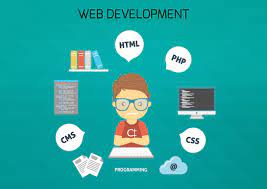
Website development is a field that constantly evolves to keep up with technological advancements and changing user expectations. As aspiring web developers and seasoned professionals look to stay ahead in this dynamic industry, it’s essential to keep an eye on the emerging trends shaping website development courses. In this article, we’ll explore the latest trends that are influencing the way website development courses are designed and delivered.
- Responsive and Mobile-First Design
The proliferation of mobile devices has made responsive and mobile-first design a top priority for web developers. Website development courses are now emphasizing the importance of creating web applications and sites that not only adapt to various screen sizes but also prioritize mobile users’ experiences. Learning to design with mobile in mind is becoming a fundamental skill for web developers.
- Progressive Web Apps (PWAs)
Progressive Web Apps are web applications that combine the best of both worlds: the capabilities of a native app and the accessibility of a website. PWAs are gaining traction due to their offline functionality, quick loading times, and seamless user experiences. Website development courses are incorporating PWA development to equip students with the skills needed to create these innovative web applications.
- JavaScript Frameworks and Libraries
JavaScript continues to be a cornerstone of web development, and its popularity shows no signs of waning. Courses are placing a stronger emphasis on JavaScript frameworks and libraries like React, Angular, and Vue.js. These tools streamline development, enhance user interfaces, and allow for the creation of dynamic, interactive websites.
- Serverless Architecture
Serverless computing is transforming the way web applications are developed and deployed. In website development courses, students are learning how to build applications without managing servers, focusing instead on writing code and utilizing cloud-based services. This trend simplifies development and reduces infrastructure costs.
- API-First Development
Application Programming Interfaces (APIs) are crucial for connecting different software components. Website development courses are teaching students how to design, develop, and consume APIs effectively. This knowledge enables developers to create modular, scalable web applications that can easily integrate with other systems.
- Cybersecurity and Data Privacy
With the increasing frequency of cyberattacks and data breaches, cybersecurity has become a paramount concern. Website development courses are incorporating cybersecurity best practices to teach students how to secure their web applications, protect user data, and stay compliant with data privacy regulations like GDPR and CCPA.
- Artificial Intelligence (AI) and Machine Learning
AI and machine learning are making their way into web development. Website development courses are introducing students to AI-powered tools for tasks like content generation, user behavior analysis, and chatbot integration. Familiarity with AI technologies can give developers a competitive edge in creating more intelligent and personalized web experiences.
- Accessibility and Inclusivity
Ensuring that websites are accessible to all users, including those with disabilities, is a growing priority in website development. Courses are focusing on web accessibility standards, such as WCAG, and teaching developers how to create inclusive user interfaces and content.
- Blockchain Integration
Blockchain technology is not limited to cryptocurrencies; it has potential applications in web development as well. Website development courses are introducing blockchain concepts, smart contracts, and decentralized applications (DApps), paving the way for innovative web solutions.
- Content Management Systems (CMS)
While CMS platforms like WordPress and Drupal have been around for a while, website development courses are teaching students how to leverage these systems effectively. Understanding how to work with CMSs is valuable for developers working on content-heavy websites and for clients who prefer user-friendly content management.
Conclusion:
Website Development Course In Patna are evolving to equip students with the skills and knowledge needed to thrive in a rapidly changing industry. Staying up-to-date with these trends can help both aspiring and experienced web developers remain competitive and create web experiences that meet the demands of modern users. As the field continues to evolve, it’s essential for developers to embrace lifelong learning and adapt to emerging technologies and practices.


